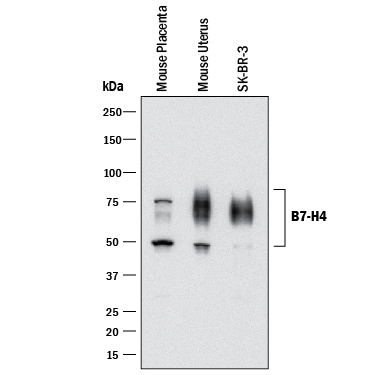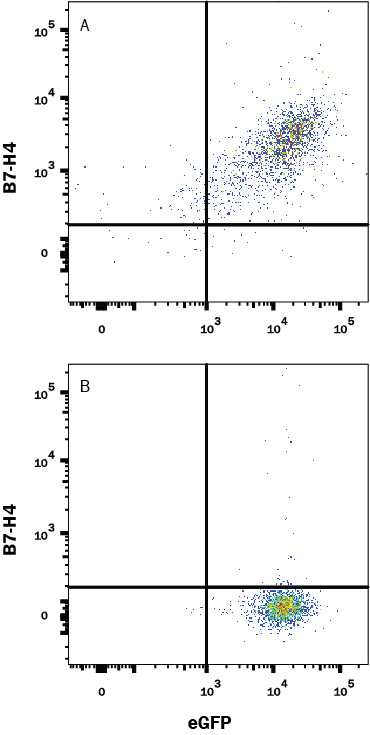Human/Mouse B7-H4 Antibody Summary
Phe29-Pro258
Accession # Q7TSP5
Applications
Please Note: Optimal dilutions should be determined by each laboratory for each application. General Protocols are available in the Technical Information section on our website.
Scientific Data
 View Larger
View Larger
Detection of Mouse and Human B7‑H4 by Western Blot. Western blot shows lysates of mouse placenta tissue, mouse uterus tissue, and SK-BR-3 human breast cancer cell line. PVDF membrane was probed with 2 µg/mL of Goat Anti-Mouse B7-H4 Antigen Affinity-purified Polyclonal Antibody (Catalog # AF2154) followed by HRP-conjugated Anti-Goat IgG Secondary Antibody (Catalog # HAF017). Specific bands were detected for B7-H4 at approximately 50-75 kDa (as indicated). This experiment was conducted under reducing conditions and using Immunoblot Buffer Group 1.
 View Larger
View Larger
Detection of B7-H4 in HEK293 Human Cell Line Transfected with Mouse B7-H4 and eGFP by Flow Cytometry. HEK293 human embryonic kidney cell line transfected with either (A) mouse B7-H4 or (B) irrelevant protein and eGFP was stained with Goat Anti-Human/Mouse B7-H4 Polyclonal Antibody (Catalog # AF2154) followed by APC-conjugated anti-Goat IgG Secondary Antibody (Catalog # F0108). Quadrant markers were set based on Goat IgG control antibody staining (Catalog # AB-108-C). View our protocol for Staining Membrane-associated Proteins.
Reconstitution Calculator
Preparation and Storage
- 12 months from date of receipt, -20 to -70 °C as supplied.
- 1 month, 2 to 8 °C under sterile conditions after reconstitution.
- 6 months, -20 to -70 °C under sterile conditions after reconstitution.
Background: B7-H4
B7-H4, also known as B7x and B7S1, is a 50 ‑ 80 kDa glycosylated member of the B7 family of immune co‑stimulatory proteins (1, 2). Mature mouse B7-H4 consists of a 230 amino acid (aa) extracellular domain (ECD) with one Ig-like V-set domain and one Ig-like C2-set domain which is followed by a hydrophobic C-terminal region (3 - 5). Within the ECD, mouse B7-H4 shares 90% and 99% aa sequence identity with human and rat B7-H4, respectively. It shares 21% ‑ 29% aa sequence identity with mouse B7-1, B7-2, B7-H1, B7-H2, B7‑H3, and PD-L2. B7-H4 is expressed on the surface of activated lymphocytes, macrophages, monocytes, dendritic cells, epithelial cells, and bone marrow-derived mesenchymal stem cells (4 - 8). Its binding to activated T cells dampens T cell responses and induces cell cycle arrest in the T cell (3 - 5). Reverse signaling can induce either cell cycle arrest or apoptosis in the B7-H4 expressing cell (9, 10). B7-H4 is up‑regulated in several carcinomas in correlation with tumor progression and metastasis (2, 7, 11, 12). A soluble form of B7-H4 is elevated in the serum of ovarian cancer, renal cell carcinoma, and rheumatoid arthritis patients, also in correlation with advanced disease status (13 - 15). Soluble B7-H4 functions as a decoy molecule that blocks the inhibitory influence of B7-H4 on immune activation (15). Despite evidence for the involvement of B7-H4 in immune regulation, mice deficient in its expression do not show significant immune deficiencies, suggesting compensation by other molecules in vivo (16).
- Yi, K.H. and L. Chen (2009) Immunol. Rev. 229:145.
- Salceda, S. et al. (2005) Exp. Cell Res. 306:128.
- Zang, X. et al. (2003) Proc. Natl. Acad. Sci. 100:10388.
- Prasad, V.R. et al. (2003) Immunity 18:863.
- Sica, G.L. et al. (2003) Immunity 18:849.
- Kryczek, I. et al. (2006) J. Exp. Med. 203:871.
- Tringler, B. et al. (2005) Clin. Cancer Res. 11:1842.
- Xue, Q. et al. (2010) Stem Cells Dev. 19:27.
- Song, H. et al. (2008) Cancer Lett. 266:227.
- Park, G.B. et al. (2009) Immunology 128:360.
- Zang, X. et al. (2007) Proc. Natl. Acad. Sci. 104:19458.
- Krambeck, A.E. et al. (2006) Proc. Natl. Acad. Sci. 103:10391.
- Simon, I. et al. (2006) Cancer Res. 66:1570.
- Thompson, R.H. et al. (2008) Cancer Res. 68:6054.
- Azuma, T. et al. (2009) PloS Med. 6:e1000166.
- Suh, W.-K. et al. (2006) Mol. Cell. Biol. 26:6403.
Product Datasheets
Citations for Human/Mouse B7-H4 Antibody
R&D Systems personnel manually curate a database that contains references using R&D Systems products. The data collected includes not only links to publications in PubMed, but also provides information about sample types, species, and experimental conditions.
4
Citations: Showing 1 - 4
Filter your results:
Filter by:
-
Pancreatic epithelial IL-17/IL-17RA signaling drives B7-H4 expression to promote tumorigenesis
Authors: Castro-Pando, S;Howell, RM;Li, L;Mascaro, M;Faraoni, EY;Le Roux, O;Romanin, D;Tahan, V;Riquelme, E;Zhang, Y;Kolls, JK;Allison, JP;Lozano, G;Moghaddam, SJ;McAllister, F;
Cancer immunology research
Species: Transgenic Mouse
Sample Types: Whole Tissue
Applications: Immunohistochemistry -
Molecular Pathways: Evaluating the Potential for B7-H4 as an Immunoregulatory Target
Authors: HL MacGregor, PS Ohashi
Clin. Cancer Res, 2017-03-21;0(0):.
Applications: IHC -
Loss of Peripheral Protection in Pancreatic Islets by Proteolysis-Driven Impairment of VTCN1 (B7-H4) Presentation Is Associated with the Development of Autoimmune Diabetes.
Authors: Radichev I, Maneva-Radicheva L, Amatya C, Salehi M, Parker C, Ellefson J, Burn P, Savinov A
J Immunol, 2016-01-15;196(4):1495-506.
Species: Mouse
Sample Types: Whole Tissue
Applications: IHC -
B7-H3 and B7x are highly expressed in human prostate cancer and associated with disease spread and poor outcome.
Authors: Zang X, Thompson RH, Al-Ahmadie HA, Serio AM, Reuter VE, Eastham JA, Scardino PT, Sharma P, Allison JP
Proc. Natl. Acad. Sci. U.S.A., 2007-11-27;104(49):19458-63.
Species: Human
Sample Types: Whole Tissue
Applications: IHC
FAQs
No product specific FAQs exist for this product, however you may
View all Antibody FAQsReviews for Human/Mouse B7-H4 Antibody
There are currently no reviews for this product. Be the first to review Human/Mouse B7-H4 Antibody and earn rewards!
Have you used Human/Mouse B7-H4 Antibody?
Submit a review and receive an Amazon gift card.
$25/€18/£15/$25CAN/¥75 Yuan/¥2500 Yen for a review with an image
$10/€7/£6/$10 CAD/¥70 Yuan/¥1110 Yen for a review without an image

